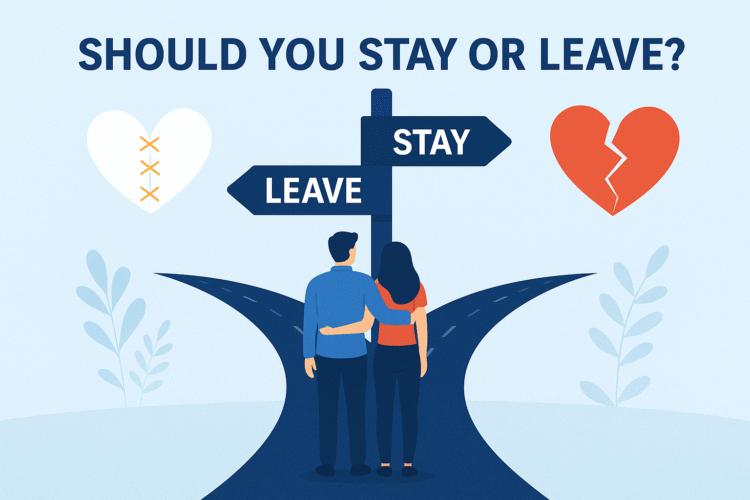Introduction: The Crossroads of a Marriage
It’s 3 a.m., and you’re lying awake again.
Your partner is breathing quietly next to you, or maybe they’re not home, maybe they’re on the couch, or maybe you’re sleeping in separate rooms now.
But you’re not sleeping.
You’re running through the question you keep hoping you won’t have to answer: Should I stay, or is it time to go?
You’re not alone in this sleepless place.
Millions of people face this exact question every year.
Marriage, even when loving and committed, can stretch to a place where it stops feeling like home.
And yet, walking away can feel equally unbearable.
Especially when there’s history involved, like shared homes, shared children, shared lifetimes.
But if you’re reading this, maybe something inside you still wants to know if there’s a version of your relationship that’s worth fighting for.
This post is not about giving you black-and-white answers.
What I will do is walk with you, slowly and honestly, through what the research actually shows.
Not the myths you’ve heard at brunch or in sitcoms.
We’ll explore real signs your marriage might still be worth saving, the conditions that make healing possible, and the patterns that make it harder to come back from.

Love, Values, and the Willingness to Do the Work
Psychologist Dr. Susan Johnson, founder of Emotionally Focused Therapy, notes that “love is not just a feeling, it’s a survival code we carry in our brains”.
That means when it feels like your partner has become emotionally unreachable, it doesn’t just hurt; it sends your nervous system into alarm mode.
But here’s what’s important: if that emotional bond is not entirely severed, if you still care, even beneath the frustration or silence, that’s a powerful resource.
Emotional presence, even if faint or wounded, is a root you can regrow from.
And don’t underestimate the value of shared core values.
Values are the compass that helps you find common ground even when emotions are high.
For example, couples who share beliefs around family, financial responsibility, and commitment tend to weather challenges more successfully, even if they argue often.
A general principle in couples therapy highlights that couples who agree on just three things, how they view fairness, intimacy, and decision-making, are significantly more likely to resolve conflict successfully.
Our personal lived experience can attest to that in this instance.
The key isn’t agreement alone, but the willingness to dialogue about agreements and disagreements regularly.
So when you’re assessing your relationship, ask:
- Do we still care about some of the same things?
- Are we both able and willing to work, not just wish?
- Do we show up for hard conversations, even clumsily?
Because when effort is still on the table, love has a way of reshaping itself.
The VSA Model: Stress, Vulnerability, and How You Adapt
To better understand how marriages thrive or collapse, let’s revisit the VSA Model (Karney & Bradbury, 1995), which is still widely cited in modern couples therapy.
The model basically says three major forces shape marriage outcomes:
- Enduring vulnerabilities: things you each bring from the past, like anxiety, trauma, or unhealthy coping styles.
- Stressful events: life doesn’t slow down, job loss, caregiving burnout, kids with special needs, and death of a parent.
- Adaptive processes: how you respond to the above, whether you reach for each other or retreat into survival mode.
Most couples can survive any one of those areas being challenged.
But when two or all three show up at once, and your coping strategies aren’t solid, that’s when things often fall apart.
Imagine this: You and your partner have unresolved childhood wounds.
Then you both lose your jobs in a down economy.
You start fighting about money, or worse, stop talking altogether.
If your conflict style is aggressive and your partner’s is avoidant, you might find yourselves stuck in repeated trauma loops.
But now imagine: You still communicate. You ask for space without punishing silence. You express needs without blame. That’s adaptive capacity. That’s gold.
Psychologist Dr. Alexandra Solomon says,
“Marriage is not about solving all your partner’s problems. It’s about being the soft place to land as they deal with their problems.”
When both people become that soft place, consistently, it rewires the relationship from crisis mode into something stable and safe again.
The Four Horsemen: And What Happens Before They Show Up
You’ve probably heard about John Gottman’s “Four Horsemen”: criticism, contempt, defensiveness, and stonewalling.
It is a well-known concept in relationship psychology that describes four negative communication behaviours that, when persistent and unaddressed, strongly predict relationship breakdown or divorce.
The term is borrowed from the biblical Four Horsemen of the Apocalypse, symbolising conquest, war, famine, and death, to signal how destructive these patterns can be in romantic partnerships.
But what most people don’t realise is that these don’t show up overnight.
They’re usually preceded by weeks, months, or years of missed bids for connection.
A “bid” is what Gottman calls the small requests we make for attention, affirmation, or affection.
A sarcastic “nice of you to come home before midnight” might actually mean, “I miss you.”
A complaint about dishes might mean, “I feel like I’m doing this alone.”
When bids go unrecognised or are dismissed, over and over, the emotional bank account dries up.
That’s when contempt creeps in.
Not when someone rolls their eyes one time, but when the entire tone of the relationship becomes one of disrespect, disgust, or moral superiority.
Here’s the hopeful part: Gottman also found that couples who learn to repair after conflict, even clumsily, tend to thrive long-term.
It’s not about never fighting.
It’s about finding your way back to each other, sooner and more often.
A genuine apology.
A quiet moment of affection.
Saying, “That didn’t come out right. Can I try again?”
Those aren’t signs of failure.
They’re signs of connection.
If those still happen in your relationship, even if only occasionally, you might have something to build on.
Weird as that might sound.
Friendship, Not Fireworks: What Lasts When Romance Fades
One of the most common myths in relationships is the idea that passion is the central glue and thing to be chased after at all costs.
It’s the be-all and end-all.
We chase it, we mourn it when it fades, and we often mistake its absence for a relationship that’s over.
But passion, according to Helen Fisher, a biological anthropologist at Rutgers, is hormonally tied to the early courtship phase.
It’s not meant to last in the same way.
What remains isn’t less important; it’s more stable, more enduring.
In long-term relationships, friendship is the true backbone. Not passion.
And not just getting along.
True friendship in marriage means:
- You share each other’s inner worlds.
- You care about each other’s daily experiences.
- You defend each other in your absence.
- You turn toward, not away, when stress hits.
Social scientist Arthur Brooks wrote in The Atlantic, “Friendship is love without wings.”
In fact, long-term marital happiness correlates most strongly with liking your partner, not loving them romantically, but enjoying them and their company.
And here’s where that myth bites us … many couples panic when the sexual chemistry cools or gets interrupted by kids, health, or life stress.
They wrongly assume they’ve fallen out of love.
But what usually happens is that friendship has been underfed.
And that’s the critical point here.
Our sex lives go through seasons, usually affected by what’s going on around us.
But that’s not to say that since you’re in a sexual lull, your marriage is over.
No, to assess your own marriage, instead ask:
- Can we still laugh together, really laugh?
- Do I care what’s going on inside them, even if I’m frustrated?
- Do they reach for me when something good or bad happens?
Those types of questions and answers reveal more about your long-term connection than candlelit dinners or Instagram-perfect vacations ever could.
More Myths That Lead People Astray
❌ “Fighting means we’re not meant for each other”
Wrong.
In fact, 69% of conflict in happy marriages is never fully resolved, according to Gottman’s decades of research.
That means “the issue” isn’t the problem..
It’s how you talk about it, how you repair, and how you show care while still disagreeing.
❌ “Once the trust is broken, it’s gone forever”
Also wrong.
Trust can be rebuilt.
It requires time, transparency, changed behaviour, and what researchers call consistent repair attempts.
In other words, trust doesn’t come back all at once; it accumulates again in moments, in being reliable, in doing what you say you’ll do, again and again.
❌ “Marriage shouldn’t be this hard”
Here’s a reality check:
Any long-term commitment involving two entire histories, psyches, needs, and stress responses is going to be at times very hard.
The myth of effortless compatibility has done enormous damage.
It simply does not work like that.
Hollywood movies and social media have sold you a bunch of BS.
Marriage is less like discovering a soulmate and more like sculpting one together over time, with blisters and breakthroughs.
❌ “You have to fix everything before it gets better”
Nope.
Often, couples move forward while still being messy, confused, or inconsistent.
You don’t need to resolve your entire past before moving toward repair.
You just need a mutual desire to do things differently tomorrow, starting today, in this moment.
And those things can be small, consistent actions taking you forward towards your common goal.
But what about,
Therapy: How to Know If It’s Working
Couples therapy or coaching can be transformational.
But like anything involving human behaviour, it’s complex.
And not all therapy is helpful. I’m sorry, it just ain’t.
Also, not all therapists are trained in evidence-based approaches.
And not all couples walk in ready to do the work.
More than that, there’s also the saying that ‘no amount of therapy can overcome the wrong choice in a partner.’
These are a lot of qualifiers for therapy to work.
And it can work … in some cases.

Here’s how to tell if therapy is working:
- You leave sessions feeling heard, even if raw.
- The therapist guides you back to each other, not into blame cycles.
- You’re learning new tools, not just rehashing old arguments.
- You’re starting to see your partner more clearly, not the version in your mind you built in anger.
One such therapeutic approach is EFT.
Emotionally Focused Therapy (EFT), developed by Dr. Sue Johnson, boasts a 70–75% success rate in clinical studies. That’s massive.
It focuses on attachment wounds, emotional vulnerability, and helping partners reach for each other, not fight or flee.
Another is IBCT.
Integrative Behavioural Couple Therapy (IBCT) shows strong results, especially in long-standing conflicts.
It blends acceptance with change, and doesn’t demand perfection to move forward.
Ultimately, when therapy becomes a place to stockpile blame, or if one partner uses it to posture rather than engage, that’s a red flag.
Healing requires both parties owning their impact and opening up to new patterns.
Good therapeutic models and practitioners will help you with that.
Others will waste your time and money.
But what if your partner won’t go to therapy?
You can start solo.
Studies show that individual therapy can improve the relationship, especially if it focuses on relational patterns, not just personal stress.
So, what about,
Infidelity: Rebuilding After Betrayal
Cheating is often considered the line in the sand.
And understandably, it cuts at the deepest trust.
But here’s what many therapists and researchers know:
Infidelity is not always the cause of a broken marriage. Often, it’s the symptom of a relationship already in distress.
Dr. Esther Perel, author of The State of Affairs, explains that “people who stray are often not looking for another person, they’re looking for another version of themselves.”
Now, that doesn’t justify betrayal. Of course not!
But it reframes the conversation.
Affairs happen in the context of disconnection, unmet needs, and sometimes deep identity confusion.
Which is why recovery is possible (although extremely difficult).
But it requires:
- Full ownership from the unfaithful partner.
- Zero defensiveness.
- 100% transparency and accountability going forward.
- A shift in relational dynamics, not just forgiveness.
- A rebuilding of trust (this could take years).
In her TED Talk, Perel says, “Your first marriage is over. Would you like to build a second one, together, with the same person?”
Some couples say the post-affair version of their marriage is more honest, more awake, more alive.
But it didn’t happen by accident.
It happened by wading through the wreckage together, without denial or spiritual bypassing.
However, for others, it truly is the end of the road.
When Leaving Might Be the Healthier Option
Let’s now also talk about something some people don’t always want to hear, yet many desperately need to.
Sometimes, staying is no longer love and the wise thing to do.
It’s self-erasure.
And in those moments, walking away isn’t failure.
It’s not “giving up.”
It’s survival.
It’s self-trust.
It’s choosing to stop bleeding just to keep something familiar alive.
We often hear “all marriages are hard” (they can be) or “you have to fight for love” (you must)…
But that wisdom, while well-meaning, becomes dangerous when it convinces people to stay in relationships that are quietly, or loudly, destroying them.
Red Flags That Signal Leaving May Be the Healthier, Braver Choice
Here are some signs, drawn from relationship psychology, trauma therapy, and real lived experience, that staying may not just be unwise, it may be unsafe:
1. Emotional or Psychological Abuse
This can be harder to name than physical violence, but no less damaging.
It includes:
- Gaslighting: making you question your memory, judgment, or sanity.
- Chronic belittling or humiliation.
- Manipulation disguised as concern.
- Isolation from friends, family, or support systems.
- Mood control, where their anger, depression, or approval dictates your emotional climate.
According to the National Domestic Violence Hotline, many survivors report that emotional abuse is harder to recover from than physical violence, because it erodes their sense of self.
For instance, if you constantly feel “crazy,” like you’re “too sensitive,” or you’re afraid of your partner’s reaction to normal feelings, that’s not love.
That’s control.
2. Physical or Sexual Abuse
This should never be negotiable.
No apology, no trauma history, no promise to change justifies physical violence. Ever.
So, if your partner ever:
- Hits, shoves, grabs, or restrains you.
- Destroys property to intimidate you.
- Forces or pressures you sexually.
- Threatens harm to you, pets, kids, or themselves.
Leave. Get help.
Reach out to a hotline or local domestic violence centre.
You are not “too much” or “overreacting.”
You are allowed to be safe.
Always.
Resources: thehotline.org – available 24/7 via chat or call.
3. Persistent, Patterned Betrayal
Infidelity in itself isn’t always the death of a marriage.
But chronic, unrepentant betrayal is different.
If cheating is a repeated pattern, especially with no genuine remorse or change in behaviour, it often signals a lack of emotional integrity and empathy.
If your partner justifies betrayal, blames you for it, or flips it around to make you feel responsible for their behaviour, it becomes a form of emotional abuse.
In that case, trust is not just broken, it’s weaponised. And that something else entirely.
Healing from one affair requires enormous effort; we’ve already talked about that.
But healing from serial deceit while being blamed for it?
That’s psychological erosion.
And you’re there to pick up the tab.
4. Stonewalling That Becomes Abandonment
All couples stonewall at times, usually as a coping mechanism.
We all need space and silence from time to time. That’s normal.
But when emotional withdrawal becomes chronic, it creates a marriage in name only.
That isn’t about a bad week or needing space.
This is when one partner:
- Refuses to engage for days, weeks, or months.
- Shuts down emotionally and never returns.
- Avoids all responsibility for conflict or repair.
- Lives a separate emotional life with no intimacy, connection, or warmth.
That is a form of abandonment.
And while it may not be as loud as fighting, it slowly hollows out your sense of worth and could be even more costly in the end.
You may feel lonely in the same room.
You may dread every interaction.
You may feel like your emotional needs are punishable offences.
If that’s your daily reality, and attempts at reconnection are met with disdain or apathy, you are alone.
Even if married.
So the question then becomes: why stay?
5. One-Way Workload
Sometimes, one partner becomes the emotional engine of the marriage.
You initiate all the conversations.
You read all the books.
You bring up therapy.
You ask questions.
You reflect.
You bend.
You make the effort.
You apologise.
And they…exist.
The reality, however, is that one person cannot build a marriage.
Even a therapist or spiritual guide cannot fix a relationship with only one participant.
And if you’ve brought it up gently, directly, emotionally, rationally, and nothing changes, it may be time to ask: Am I the only one trying to be here?
And if that is the case, then maybe it’s time for a different conversation.
Yes, relationships don’t need symmetry or the same amount of effort all the time. Life doesn’t work that way.
But they need reciprocity.
Why People Stay (And Why That’s Okay, Until It’s Not)
In general, people tend to stay because of:
- Fear. Of starting over. Of being alone.
- Guilt. “But they’re a good parent.” “They had a hard childhood.” “I made mistakes too.”
- Hope. That it will go back to the beginning. That they’ll change. That this is just a phase.
These are human responses, not weaknesses.
Leaving is hard.
It’s grieving a living person.
It’s walking away from the idea you built of what life could be.
It’s untangling shared finances, kids, holidays, in-laws, and dreams.
And all of that is hard to conceive and even harder to do…
But here’s the question you eventually have to ask:
If nothing changes, ever, is this the life you want to keep living?
Becasue staying becomes unhealthy when:
- You’ve lost sight of your needs altogether.
- You’ve stopped feeling safe, emotionally or physically.
- You’re modelling a distorted version of love for your children.
- You feel like your soul is whispering, “This isn’t me anymore.“
Leaving Is a Form of Love, Sometimes the Truest One
It’s important to realise that leaving doesn’t mean you hate them.
It simply means you love yourself enough not to disappear.
It doesn’t mean you didn’t try.
It means you stopped trying to fix something that isn’t fixable alone.
It doesn’t mean you’re heartless.
It means your heart can no longer survive on scraps.
And for some, it’s not just about ending pain, it’s about preventing further harm.
For yourself. For your children. For your future relationships.
Maybe you need to hear this, so let me be the one to tell you: Staying in a toxic or emotionally abusive marriage doesn’t protect kids.
It teaches them that love is abandonment, that connection is control, that intimacy means fear.
Leaving, when done with integrity and intention, can become the very act that teaches them what boundaries, self-worth, and emotional safety look like.
A Gentle Word as You Stand on the Threshold
So, if you’re here because you’re not sure, know this: ambivalence is a sign you still care about them, or about what the relationship once meant.
That matters.
But don’t confuse pain with purpose. Or obligation with loyalty.
You are not required to suffer in the name of someone else’s comfort.
When you reach the place where you feel like you’re “trying to make yourself small enough to be loved,” as therapist Lisa Olivera puts it, you’ve already started to leave emotionally.
The rest is catching up.
Take your time.
Build a support system.
See a therapist if you can.
Let the truth come gently, and when it does, listen.
Because whatever path you choose, staying, rebuilding, or walking away, let it come from love, not fear.
Let it come from clarity, not chaos.
You deserve to feel like yourself again.
Final Reflection: How to Trust What You Know
So, should you stay? Or is it time to go?
Only you know.
But here’s what we’ll offer, from research and from walking with many couples through the fog:
Stay if you’re both willing to try.
Stay if there’s still warmth in the room, however faint.
Stay if you can see a future where you laugh again.
Stay if you’re both willing to change the patterns, not just win the arguments.
Stay if you want to become friends again, even before lovers.
But go if love has turned to harm.
Go if the silence has grown so thick that even therapy can’t cut through.
Go if you’re the only one reaching.
And go knowing that leaving doesn’t mean you failed.
It means you’re brave enough to choose something else.
Whether that’s peace, growth, or simply quiet mornings without walking on eggshells.
Whatever you decide, let it come not from panic, but from clarity.
Let it come from a voice that isn’t begging to be rescued, but finally saying, I know what I deserve. And I know what I’m capable of giving.
And that, more than anything else, will lead you home, whether it’s to a healed marriage or a new life on your own terms.
We hope you find your way.
FAQ (Frequently Asked Questions)
1. How do I know if my marriage is really over?
A marriage may be over when respect, emotional safety, and the willingness to repair are gone, and they’ve stayed gone despite honest effort.
Chronic emotional or physical abuse, persistent contempt, and a refusal to acknowledge harm or seek help are strong indicators.
If being in the relationship consistently diminishes your well-being or sense of self, it may be time to consider leaving, not out of failure, but out of self-preservation.
2. Can therapy save every marriage?
Therapy can be life-changing, but only if both partners show up with openness and humility.
If one person consistently refuses to engage, blames the therapist, or only attends to avoid conflict, therapy may become ineffective.
That said, individual therapy can still help you find clarity, heal emotional wounds, and prepare for whatever path you choose, even if the relationship ends.
3. Is it wrong to stay together just for the kids?
It’s a deeply personal choice, and it depends on what staying looks like.
Staying in a high-conflict or emotionally cold marriage can negatively impact children, often more than divorce itself. Kids thrive in environments that are stable, loving, and emotionally safe, whether that’s in one home or two.
Peaceful co-parenting after separation is often healthier than staying “together” in dysfunction.
4. What if love is still there but trust is gone?
Love can survive betrayal, but trust must be rebuilt for the marriage to heal.
This isn’t just about forgiveness, but about transparency, consistent accountability, and shared commitment to change.
Couples often recover from broken trust with the help of qualified therapists, open dialogue, and time, but both people must be all in.
5. Does religion or culture affect the decision to stay or leave?
Yes, faith and cultural identity deeply influence how people view commitment and divorce.
In some communities, leaving may carry stigma or spiritual conflict.
However, many religious and cultural leaders now recognise that staying in a marriage marked by abuse, neglect, or harm is not spiritually sound.
You can honour your values while also honouring your safety and dignity.
6. What if I truly don’t know what I want right now?
That’s okay, and very normal.
When you’re in emotional survival mode, clarity often feels distant.
What helps is not waiting passively, but actively engaging with your questions.
Journal. Seek support.
Talk to a therapist.
Give yourself a time frame to check in.
Clarity often arrives not in one “aha” moment, but through small insights gathered over time.


